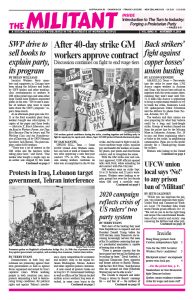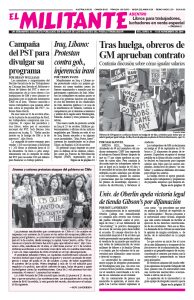MIAMI — The state of Florida cannot require ex-felons to pay all outstanding court fees, fines and restitution before they are allowed to vote, a federal judge here ruled Oct. 18. This decision is the latest development in the fight to force Democratic and Republican politicians to implement Amendment 4, which restores the right of former felons in Florida to vote, except those convicted of murder or sex crimes. The popular measure was adopted by more than 64% in November 2018.
An estimated 1.4 million workers have been denied their right to vote in Florida. “Historically, Florida disenfranchised a higher percentage of its adult citizens than any other state in the United States, more than 10 percent of the overall voting age population, and more than 21 percent of the African-American voting age population,” the NAACP Legal Defense and Educational Fund said in its court brief calling for state law SB 7066 to be overturned.
After Amendment 4 passed, the Florida state legislature retaliated by adopting new restrictions requiring ex-felons to first pay all court fees before they can legally register to vote. Otherwise they are committing a crime and can be sent back to prison.
Seventeen former prisoners challenged this reactionary law, whose goal was to limit the franchise. The American Civil Liberties Union, NAACP Legal Defense and Educational Fund, Southern Poverty Law Center, and Campaign Legal Center filed legal challenges to the law on their behalf.
These suits were consolidated into one case by federal Judge Robert Hinkle, who issued a preliminary injunction Oct. 18 saying the state cannot use a person’s inability to pay court fines to deny their basic right to vote. This ruling initially will affect only the 17 who filed the suit, not all ex-felons. The decision will stand until the lawsuits go to trial, scheduled for April 2020.
Hinkle said that it is not unconstitutional for the state to demand all fees be paid prior to restoring someone’s voting rights, but the government cannot force a person to pay the fees if they can’t afford to. Given the pervasive job discrimination workers with a record face, many will never be able to pay off the debt.
“What the state did is impose a modern-day poll tax, the type of discriminatory law that was used in past decades to bar the right to vote for Blacks,” Anthony Dutrow, Socialist Workers Party candidate for Miami City Commission, told the Militant Oct. 20. “The fight to overturn this reactionary law is in the interests of all working people.”
There is a class bias involved in SB 7066, James Harden, a Walmart worker in Miami, told this correspondent. “The kind of sentence and the type of jail conditions a rich person gets is very different from the rest of us,” Harden said. “The majority in this state voted to let ex-felons vote. I’m opposed to any effort to take that back.”

